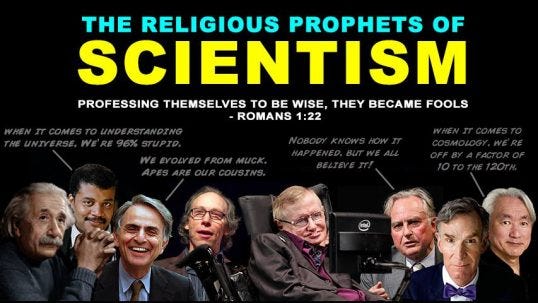Gab@StFerdinandIII - https://unstabbinated.substack.com/
Plenty of cults exist - every cult has its 'religious dogma', its idols, its 'prophets', its 'science', its 'proof' and its intolerant liturgy of demands. Cults everywhere: Corona, 'The Science' or Scientism, Islam, the State, the cult of Gender Fascism, Marxism, Darwin and Evolution, Globaloneywarming, Changing Climate, Abortion...
Tempus Fugit Memento Mori - Time Flies Remember Death

Today we are assaulted, bludgeoned, abused and debauched by the all-knowing, all-seeing, omnipotent ‘God’ of ‘Science’, interepreted by the priestly caste of self appointed apostles and little Gods of ‘science’, ‘reason’, and ‘the consensus’. The modern shamans, fakirs and druids. The egocentricitiy and corruption of modern systems of ‘science’ and inquiry is breathtaking. An ineluctable outcome of the ‘Enlightenment’. Corona and Climate totalitarianism is thus not a surprise but simply a logical endpoint to what started in the 17th century.
The roots of scientism extend as far back as early 17th century Europe, an era that came to be known as the ‘Scientific Revolution’. Prompted by the collapse of Byzantium (1453), stirred up by the age of discovery, new wealth, new materials, new trade routes and a burgeoning middle and merchant class, society was changed and quickened. A cascade of inventions in the late middle ages, including that of the printing press, changed society and ushered in aspects of modernity. The ancient pagan cults and their philosophies, including Plato and Aristotle had long been challenged but a new emphasis on proof and experimentation came to the fore.
The Musulman empire of the Ottomans forced a massive change in trade routes and new voyages of discovery initiated by the European Christians, ostensibly to acquire commodities and resources in the East. With the incredible achievements from the 15th to 17th centuries, there was now a surfeit of wealth, gold, silver, and trading profits, leading to an investment in money and time to study the ‘natural sciences’ in detail, a subject matter taught in the medieval University system as being mandatory to understand the God-created world.
The ‘scientific method’, long in existence was codified in various ways by the Catholics such as Francis Bacon, Rene Descartes, dozens of Jesuit astronomers, Copernicus, the over-rated Galileo Galilei, and Protestants such as Kepler to name a few. Over time ‘Scientific Societies’ and ‘Academies’, mimicking that of ancient-Athens, sprang up in every European country, funded by the munificence of empire, trade and wealth accretion. The main import and output of these groups and individual men was the rather monumental change in attitudes and culture, namely, to replace annotations and arguments over ancient texts with real-world experimentation.
Yet these men and the related institutions of inquiry, also created the platform for modern $cientism. Descartes and Bacon for example employed strong rhetoric to create a cultish framework for their work, believing in essence that the human could become ‘God’. They claimed that by learning how the physical world worked, we could become “masters and possessors of nature.”1 The God-created world was being remodelled along the lines of a rationalistic-hubristic philosophy, where humans replaced the divine. The philosophical foundation of society and its worldview was altered.
Through application and technical developments, Western civilisation did indeed produce societal innovations. Beneficiaries of mechanisation included transportation, war, trade, agriculture, capital creation and deployment, city and village planning, welfare, health care and the elimination of many diseases through mostly sanitation and improved medical methods (though bleeding and cutting off of limbs can hardly be claimed as ‘scientific’). Yet incorrectly, and even nefariously, these material and application improvements were all attributed to ‘science’, when in fact, it was the material wealth from discovery, trade and commerce, which generated the industrial revolution and the use of machines, or technology, which improved life. Application and technological development may or may not be related to ‘science’. It is related to productivity and profit creation, which flows back into society and various public and social improvements through various channels.
It was the great developments of the late medieval era and the early modern period which set the stage for the self-congratulatory, egocentric philosophy of $cientism. As society changed there arose from the theories of Bacon and Descartes a rather perverted and extreme view of ‘reason and logic’ through the debasement of our other faculties such as social bonds, culture, heritage, creativity, memory, and imagination. As if the ‘sewer’ as an invention sprang out of nothing. The creativity, energy, curiosity, materials, and technological capability to build and deploy sewers are indeed based on mental acuity but a whole host of other attributes which are just as important, including culture.
The ‘rationalists’ and ‘philosophes’ denigrated writing, poetry and emotions to second class status. Religion was tolerated until the French Revolution but afterwards endlessly attacked. Descartes’ rendering of the entire universe as a giant machine left little room for faith, the arts or other forms of human expression. Read more